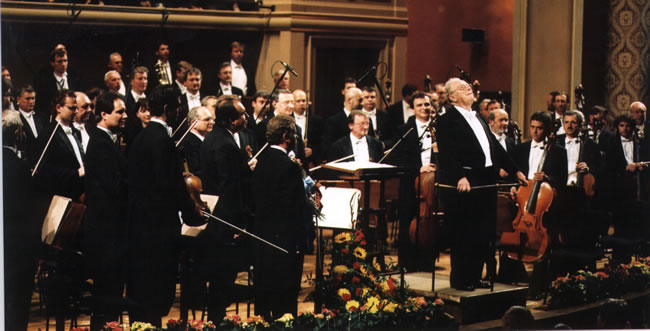Live recordings
Leoš Janáček: Jealousy
Taras Bulba
Czech Philharmonic Orchestra
conductor
Sir Charles Mackerras
live on 22nd May, 2003, Dvořák Hall, Rudolfinum

Leoš Janáček (3.7.1854 - 12.8.1928) ranks among the most inventive and innovative composers not only in his native country but all over the world. 2004 is the year of 150th anniversary of his birth.
The symphonic image Jealousy (1894) suggests a close affinity with Janáček’s opera Jenůfa, it was originally meant to be its overture. It was inspired by a folk song in which a dying outlaw wishes to kill his lover so she could not belong to anybody else.
The rhapsody for large orchestra Taras Bulba (completed 1918) was inspired by the short story of the same name by N.V.Gogol. It glorifies the heroism of the Russian people. In the part The Death of Andrei, Taras Bulba, the Cossack chief, kills his son because he betrayed his nation. The second part, The Death of Ostap, celebrates Taras’s second son who is taken prisoner and executed by the enemy. In the last part, The Prophecy and Death of Taras Bulba, Taras himself is killed but before he dies he profesies the undying power of the Russian nation.
Sir Charles Mackerras (1925) acquired his profound love of Czech music during his time studying privately under Václav Talich (1947-48), and he became an international authority in its interpretation, particularly the works of Leoš Janáček and Bohuslav Martinů. During his fruitful career he has held important posts such as conductor of the BBC Symphony Orchestra, Chief Conductor of the Hamburg State Opera, Musical Director of Sadler’s Wells in London, director of the Welsh National Opera. His recordings have gained numerous international prizes, e.g. Cannes Classical Awards in 2000 and 2003. He has travelled the world as a guest conductor performing with the leading symphony orchestras and opera houses.
The symphonic image Jealousy (1894) suggests a close affinity with Janáček’s opera Jenůfa, it was originally meant to be its overture. It was inspired by a folk song in which a dying outlaw wishes to kill his lover so she could not belong to anybody else.
The rhapsody for large orchestra Taras Bulba (completed 1918) was inspired by the short story of the same name by N.V.Gogol. It glorifies the heroism of the Russian people. In the part The Death of Andrei, Taras Bulba, the Cossack chief, kills his son because he betrayed his nation. The second part, The Death of Ostap, celebrates Taras’s second son who is taken prisoner and executed by the enemy. In the last part, The Prophecy and Death of Taras Bulba, Taras himself is killed but before he dies he profesies the undying power of the Russian nation.
Sir Charles Mackerras (1925) acquired his profound love of Czech music during his time studying privately under Václav Talich (1947-48), and he became an international authority in its interpretation, particularly the works of Leoš Janáček and Bohuslav Martinů. During his fruitful career he has held important posts such as conductor of the BBC Symphony Orchestra, Chief Conductor of the Hamburg State Opera, Musical Director of Sadler’s Wells in London, director of the Welsh National Opera. His recordings have gained numerous international prizes, e.g. Cannes Classical Awards in 2000 and 2003. He has travelled the world as a guest conductor performing with the leading symphony orchestras and opera houses.
![]() play video sample
(Leoš Janáček: Jealousy, Taras Bulba)
play video sample
(Leoš Janáček: Jealousy, Taras Bulba)
director: Stanislav Vaněk
time: 33 min.